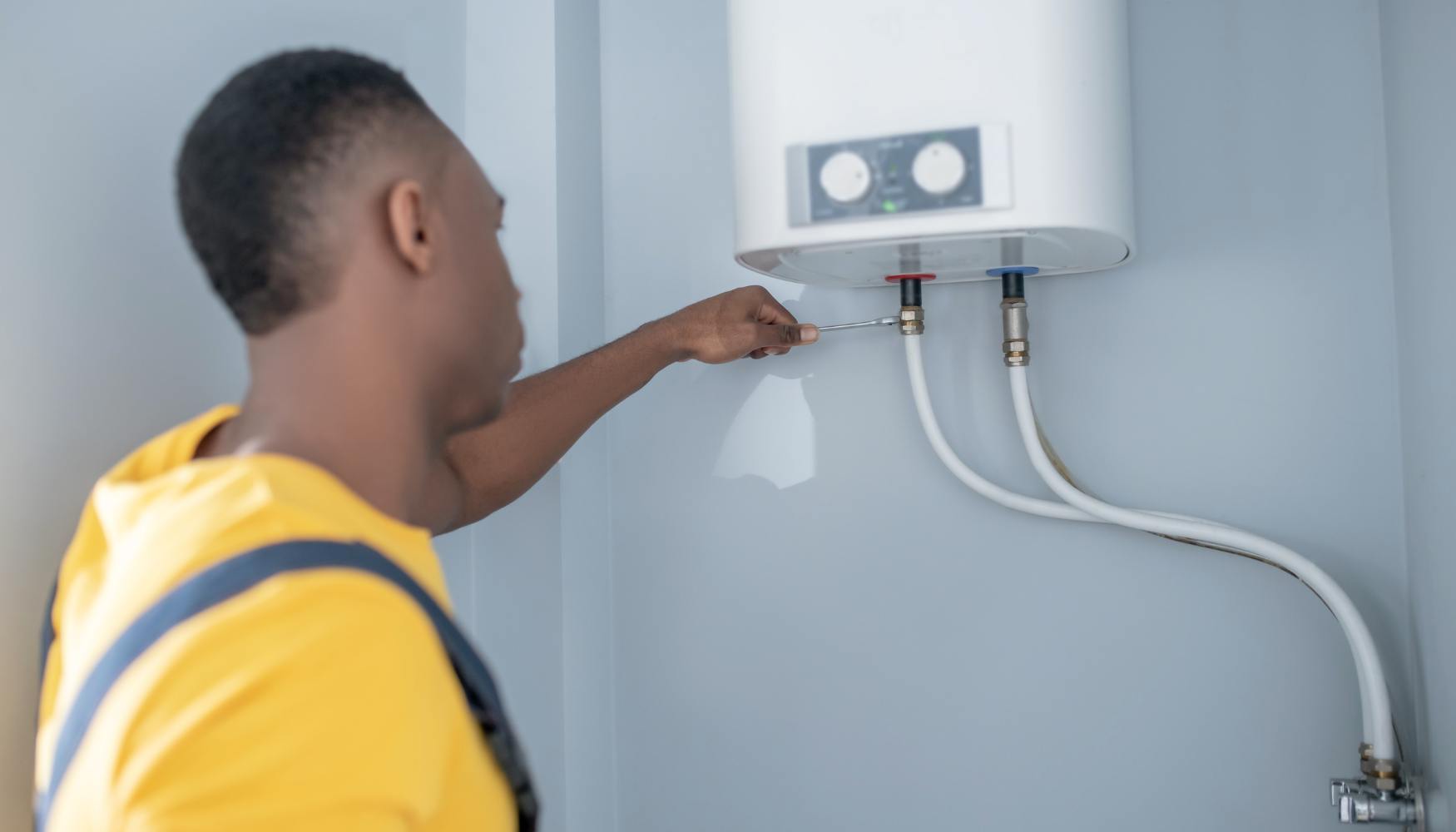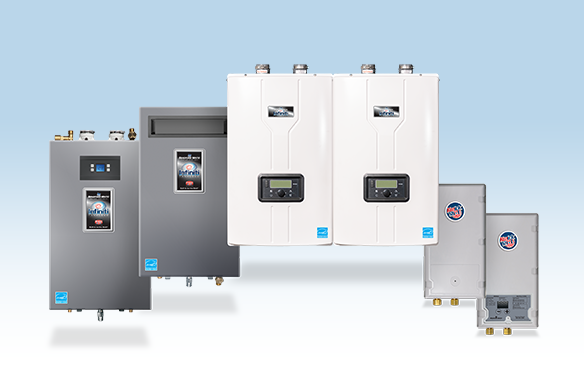Unveiling The Upsides Of Tankless Water Heaters
Unveiling The Upsides Of Tankless Water Heaters
Blog Article
What are your opinions on 5 Benefits of Tankless Water Heaters?

In a world where ease and efficiency reign supreme, it's no surprise that property owners are frequently in search of smarter ways to manage their home's power intake and convenience. One technology that has actually continuously gotten popularity is the tankless water heater. Yet just what makes these systems stand out from the standard tank-based designs a lot of us grew up with? Let's dive in and check out the benefits of tankless water heaters, helping you determine if it's time to make the switch in your home.
Intro
Picture this: you enter the shower after a long day, anticipating a relaxing cascade of warm water, only to be welcomed by icy beads due to the fact that the last individual utilized it all up. Audio acquainted? Traditional hot water heater store a fixed quantity of warm water, implying you go to the grace of that tank's supply. Tankless systems, on the other hand, warm water as needed. No more running out mid-shower, say goodbye to fumbling with timetables just to make sure warm water is readily available.
Recognizing Tankless Water Heaters
What Are Tankless Hot Water Heater?
Tankless water heaters, often known as on-demand or instant hot water heater, supply warm water just as it's needed. Rather than storing gallons of pre-heated water, these units kick right into activity the moment you turn on the faucet. Water passes through a heat exchanger, warming up in real-time, indicating you get a continuous flow of warm water without the demand for a big tank resting idly by.
Just how Do They Differ from Traditional Equipments?
Conventional heating systems hold a tank of warm water, using power to keep that storage tank at a regular temperature. Tankless systems remove the standing supply, reducing wasted energy and the large impact of a huge cylinder. Essentially, you're updating from a "stockpile" attitude to a "made-to-order" strategy.
Common Kinds Of Tankless Devices
Tankless water heaters typically are available in two varieties: gas and electric. Gas models tend to deliver higher flow rates, ideal for bigger houses, while electrical designs commonly serve smaller homes and are typically less complicated to mount. Furthermore, some systems are created for point-of-use (serving one fixture) while others can take care of the entire home's warm water requirements.
Secret Advantages of Tankless Hot Water Heater
Energy Performance and Expense Financial Savings
No more heating a titan tank's well worth of water and maintaining it cozy throughout the day. Tankless heating systems reduce standby power losses, which can lower utility bills. While the first expense may be greater, the long-term savings frequently justify the investment.
3. Space-Saving Layout
If your home is short on storage, getting rid of the large storage tank maximizes valuable room. Tankless systems are compact and can usually be installed on walls, stashed in corners, or mounted in tight energy closets without monopolizing the whole room.
4. Longer Life expectancy
A well-maintained tankless hot water heater can outlive its tank-based cousin. Standard containers may last 10-15 years, while tankless designs can maintain chugging along for twenty years or even more, making them a solid financial investment in time.
1. Limitless Warm Water Supply
Ever before had to schedule showers so everyone obtains their reasonable share of hot water? With tankless, that ends up being a thing of the past. As long as the heating unit's flow ability isn't gone beyond, you can take back-to-back showers without becoming a popsicle.
5. Improved Water Quality
Saving water in a tank can sometimes bring about sediment accumulation or a somewhat "off" taste. With tankless systems, fresh water is warmed right away, lowering the opportunities of sediment accumulation and possibly providing cleaner-tasting water.
Considerations Prior To Switching
Though the benefits are compelling, it's wise to take into consideration a couple of factors prior to fully devoting.
Evaluating Your Home's Water Use Patterns
If your home simultaneously makes use of multiple components with high hot water need, ensure the system's flow price meets your needs. Understanding your use patterns assists you pick the best dimension and kind of tankless heating unit.
Upkeep and Care Tips
Tankless systems are relatively reduced maintenance, however they aren't set-it-and-forget-it devices.
Normal Cleaning and Descaling
Hard water minerals can develop in the warm exchanger, affecting performance. Routine descaling (often recommended every year) maintains the unit going for peak performance.
Yearly Expert Evaluations
A yearly checkup from a professional ensures small concerns are captured early. They'll evaluate the unit's efficiency, try to find leaks, and aid preserve optimal performance.
Preliminary Investment Costs
Tankless heating systems commonly include a greater in advance cost. Between the system itself and potential installment alterations, the preliminary cost could provide you sticker label shock. However remember to see it as a long-term financial investment.
Installment Needs
Depending upon your home's framework, you may require additional electric capacity or gas line upgrades. Guarantee you recognize the setup requirements and talk to a specialist to prevent shocks.
Ensuring Appropriate Air Flow
For gas versions, proper air flow is vital to safely expel exhaust gases. Make sure airing vent systems are clean and appropriately set up to prevent any possible safety and security threats.
Contrasting Different Brands and Versions
Not all tankless water heaters are developed equivalent.
Investigating Reputable Manufacturers
Seek reputable brand names with a history of generating high quality devices. A reliable supplier usually provides far better customer assistance and longer warranties.
Setup: DIY or Specialist?
While some property owners delight in taking on projects themselves, tankless setup could not be the best time to break out the toolbox.
Benefits and drawbacks of Do It Yourself Installment
A DIY set up could conserve money, however it comes with dangers. Inaccurate installation can cause ineffectiveness or security problems. If you're handy and have experience, it may be feasible-- but proceed with care.
Checking Out Reviews and User Feedback
Customer testimonials and comments from neighbors or pals who have actually gone tankless can use useful insights. Sometimes, real-life experiences can be a lot more telling than advertising and marketing pamphlets.
When to Call an Expert Plumbing Technician
For the majority of, calling a professional makes sure whatever's done correctly. A professional plumbing professional comprehends neighborhood codes, sizing requirements, and airing vent criteria, decreasing the danger of mishaps.
Making best use of Efficiency
You've purchased a tankless unit-- now maximize its effectiveness.
Ideal Temperature Level Setups
Most people establish their devices in between 120-140 F. Readjusting the temperature level can enhance convenience and cost savings. Experiment to discover a wonderful area that doesn't squander energy.
Pairing with Low-Flow Fixtures
Want to stretch your system's capabilities? Consider installing low-flow showerheads and faucets. They reduce water use, enabling your tankless system to provide a steady stream of warm water without straining.
Ecological Effect
Tankless hot water heater straighten with greener living objectives.
Lowered Carbon Impact
By using much less energy and just home heating water as needed, tankless systems can decrease your home's carbon footprint, reducing your environmental influence.
Conserving Natural Resources
Much less power consumption and less thrown away hot water equate right into less natural resources being utilized, an ecological win-win.
That Profits A Lot Of from Tankless Heating units?
The charm of tankless heating systems is that they can match a range of households.
Huge Family Members vs. Solitary Residents
Huge households could like the endless warm water supply, while solitary passengers value the power savings from not warming an entire container for just someone's morning shower.
House Owners with Limited Space
If your home is short on square video, losing the cumbersome container liberates space for other basics-- or perhaps just extra elbow room.
Eco-Conscious Consumers
Going tankless aligns with eco-friendly worths, guaranteeing you're not throwing away energy or resources.
Future Trends in Tankless Water Heaters
The world of home appliances is ever-evolving, and tankless hot water heater are no exemption.
Advancements in Technology
R&D is continuously boosting heat exchangers, making systems a lot more effective and durable. Future models could be even quieter, a lot more portable, and much better fit for varying environments.
Smart Home Assimilation
Envision changing your hot water heater's temperature level through an application or getting maintenance signals on your phone. As wise home tech breakthroughs, we'll see even more connectivity and comfort.
Conclusion
Selecting a tankless hot water heater is greater than just updating your home's warm water system; it's investing in long-term convenience, energy performance, and a greener way of life. By considering your family's water use, being mindful of setup needs, and devoting to regular maintenance, you can delight in a stable stream of hot water without the baggage of a bulky container. As technology progresses, you can expect also smarter, a lot more efficient tankless solutions that not only make your life less complicated but additionally benefit the planet.
Why You Should Consider a Tankless Water Heater for Your Home
Energy Efficiency and Cost Savings
Tankless water heaters, also known as on-demand water heaters, heat water only when needed. This means they don't waste energy keeping a tank of water hot constantly. This efficiency translates into substantial cost savings on your monthly energy bills.
Endless Hot Water Supply
One of the significant advantages of tankless water heaters is their ability to provide a continuous supply of hot water. Traditional tank water heaters have a limited capacity and can run out of hot water, especially during peak usage times. In contrast, tankless water heaters can provide an endless stream of hot water, making them ideal for larger families or homes with high water usage.
Space-Saving Design
Tankless water heaters are compact and take up significantly less space compared to traditional tank heaters. They can be installed on walls, under cabinets, or even outside, freeing up valuable space in your home. This makes tankless water heaters a great option for smaller homes or properties with limited space for a traditional water heater.
Longer Lifespan and Lower Maintenance
Tankless water heaters typically have a longer lifespan compared to traditional tank heaters. They can last up to 20 years or more with proper maintenance. Additionally, tankless systems are designed with replaceable parts, which can extend their lifespan further and reduce long-term maintenance costs.
Environmentally Friendly
Reducing energy consumption not only saves you money but also benefits the environment. Tankless water heaters contribute to a smaller carbon footprint by using less energy to heat water. Their energy efficiency and ability to minimize standby heat loss make them an eco-friendly choice for environmentally conscious homeowners.
Customized Temperature Control
Tankless water heaters offer precise temperature control, allowing you to set the desired temperature to meet your specific needs. This level of customization ensures you always have water at the perfect temperature for your comfort and usage requirements.
https://beantownservices.com/blog/consider-tankless-water-heater-for-your-home

I'm just very fascinated by Six Benefits of a Tankless Hot Water Heater and I'm hoping you enjoyed the entire article. Liked our content? Please quickly share it. Help others find it. Many thanks for going through it.
Book A Service Call Report this page